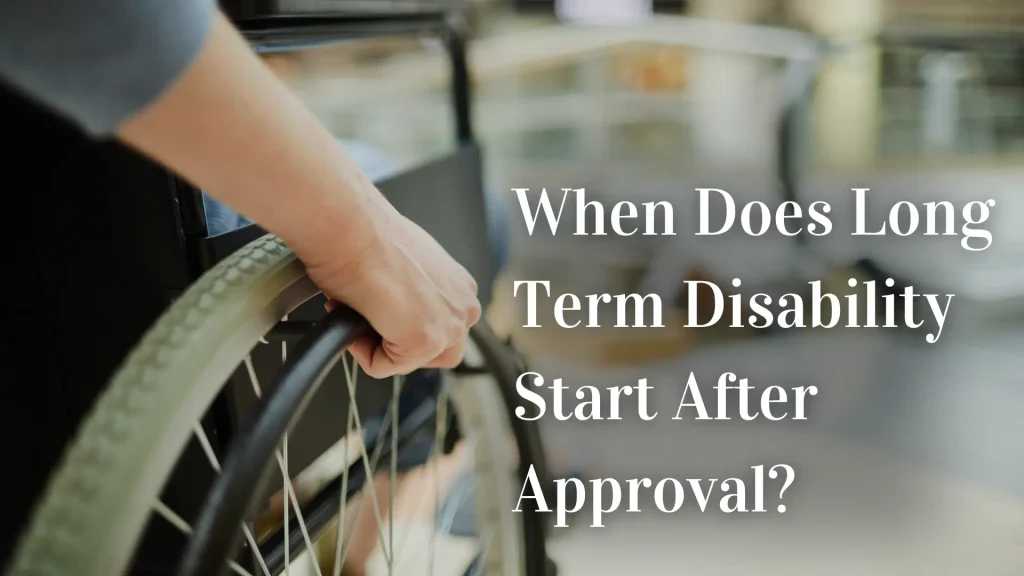
If you applied for long-term disability benefits in Indiana due to an injury that prevents you from working, when does your long-term disability start? This is a crucial question for many Hoosiers, as they rely on these benefits to make ends meet while they cannot work.
The answer depends on your particular long-term disability insurance policy, but most policies have a waiting period of about six months. The specific waiting period will be specified in your individual policy. You can apply for long-term disability (LTD) benefits before the elimination period lapses. However, after the insurance company approves your claim, you won’t be able to collect benefits until the waiting period is over.
What Is Long-Term Disability Insurance?
Long-term disability is a type of insurance you can purchase through your employer or an insurance company. This insurance covers a portion of your income if you cannot work due to an injury or illness.
You can think of long-term disability insurance as if it’s health insurance for your income. Your health insurance covers a portion of your medical costs for injuries and illnesses, while your long-term disability insurance covers a portion of your wages. Both types of insurance reduce an injury or illness’s impact on your financial stability.
The amount of benefits you receive, the length of your benefit period, and the waiting period before you begin collecting your benefits all depend on your particular policy. When shopping for long-term disability insurance, it’s essential that you find a balance between these three aspects that work for your situation.
How Does Long-Term Disability Differ from Short-Term Disability Insurance?
The primary difference between long-term and short-term disability insurance is in the length of the benefit period. Long-term disability policies have longer benefit periods, often measured in years, and are for injuries that impact your ability to earn income for extended periods. Short-term disability policies have shorter benefit periods, often measured in months, and are for injuries that impact your ability to earn income for short periods.
Do You Need Both Short-Term and Long-Term Disability Insurance?
If you have a short-term disability insurance policy, do you also need a long-term policy? And if you have a long-term disability insurance policy, do you also need a short-term policy? In general, it’s a good idea to have both a short-term and long-term policy.
With only a short-term policy, if your injury keeps you from working longer than expected, there’s a chance you could run out of funds. A long-term policy provides an extra layer of wage loss protection.
With only a long-term policy, you must cover your usual living expenses during your policy’s waiting period. Depending on your expenses, there’s a chance you could run out of funds before your benefits kick in. A short-term policy provides wage loss protection that can last during your long-term policy’s waiting period.
How Does Long-Term Disability Insurance Differ from Workers’ Compensation?
The primary distinction between long-term disability insurance and workers’ compensation insurance is what injuries the policies cover. Workers’ compensation covers injuries or illnesses in the course and scope of employment or related to work exposures. Long-term disability insurance covers any injuries and illnesses that impact your ability to work.
For example, let’s say you fell down some stairs and suffered an injury that prevented you from working. If your fall happened at work, workers’ compensation may apply, but if your fall happened at home, long-term disability may apply.
Long-Term Disability Insurance Waiting Periods

Long-term disability waiting periods, also known as elimination or qualifying periods, are the amount of time you must wait between your policy’s approval and when you receive your benefits.
If your policy has a six-month waiting period, once the provider has approved your claim, you’ll have to wait six months after the date of the injury to begin receiving checks. If your policy has a one-year waiting period, you’ll have to wait one year from the date of the injury.
A good way to think about these waiting periods is like the deductible on your health insurance. Even though you pay for your health insurance, you still have to pay out-of-pocket until you reach your deductible amount. Your health insurance policy kicks in and begins covering your medical costs only after you reach your deductible.
The waiting period is the amount of time you have to pay out-of-pocket before your long-term disability policy kicks in and begins covering a portion of your lost wages.
How Do Waiting Periods Affect My Insurance Rate?
The longer your waiting period is, the lower your insurance rate will be. For example, you would have to pay higher monthly rates on a policy with a six-month waiting period than on a policy with an 18-month waiting period.
A policy with a shorter waiting period means you’ll have a shorter gap in your income if an injury or illness prevents you from working. This shorter gap can be better for older or more frail individuals. However, younger, healthier individuals may opt for a longer waiting period because it costs less, and they’re less likely to suffer an injury or illness that prevents them from working long-term.
Long-Term Disability Attorney in Indianapolis, Indiana
Did your long-term disability insurance provider deny your claim for benefits? Is there a delay in your benefits extending beyond your policy’s waiting period? At Hankey Marks & Crider, we know how crucial your long-term disability benefits are and how challenging it can be to make ends meet if there are any delays.
Call our law firm today at (317) 634-8565 or contact us online for a free consultation with a member of our legal team. We’ll provide an initial case evaluation before reviewing your legal options and explaining how our team tackles issues related to receiving long-term disability benefits.
With over 75 years of combined experience, the Indiana long-term disability attorneys of Hankey Marks & Crider have a track record of successfully representing clients against some of Indiana’s biggest insurance companies, including MetLife, Cigna, Hartford Insurance, and Mutual of Omaha.
Related Posts:
What Are the Different Types of Permanent Partial Disability?

